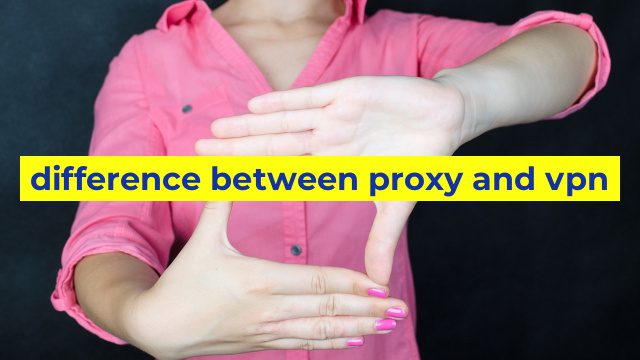The Key Differences between Proxy and VPN
There are a few crucial differences between proxy and VPN that you should know before deciding which one to use for your online activities. Although both proxy and VPN can help you to access blocked websites and protect your data from hackers, the way they work is quite different.
Proxy:
A proxy acts as an intermediary between your device and the internet. It takes your request and forwards it to the website, which returns the result to the proxy. The proxy then passes on this result to you. This way, the website can’t see your IP address but sees the proxy server’s IP. Additionally, proxy servers can also help you to bypass geo-restrictions, meaning you can access content that is otherwise unavailable in your location. However, there are some disadvantages of using proxy servers that one should know:
- Proxies offer minimum security for your online activities. They don’t encrypt your web traffic, which means your online activities aren’t secure.
- Since proxies work on a single app or browser, they do not cover all your online activities, such as torrenting or streaming.
- Since proxies are often free, their performance is unreliable and can often lead to slow browsing speeds.
VPN:
A Virtual Private Network (VPN) creates a secure and encrypted connection between your device and the internet. It redirects all of your traffic through a VPN server in another location, hiding your IP address and encrypting your data. VPN service providers use complex encryption algorithms that make it difficult for hackers to steal your data. Additionally, VPNs can help you bypass geo-restrictions, giving you access to online content that is blocked in your country. Some of the benefits of using a VPN include:
- VPNs provide secure encryption for all your online activities and conceal your identity.
- VPNs offer complete coverage for all your online activities and are ideal for online privacy-conscious users.
- VPNs are faster and more reliable than proxy servers, providing you with a seamless browsing experience.
However, it’s important to note that VPNs require a subscription, which may not be affordable for everyone. The subscription also prevents you from browsing the internet for free or without limitations.
Conclusion:
In conclusion, both proxy and VPN can offer you solutions for various online obstacles. However, VPN is the better option for online privacy and security, the power to cover all your online activities and provide faster, more reliable internet. In contrast, proxy servers are only suitable for unblocking content and are limited in their features. Ultimately, the best choice comes down to personal preference and the need for protection and accessibility.
Table difference between proxy and vpn
| Proxy | VPN |
|---|---|
| A proxy server acts as a middleman between a user’s device and the internet. It receives requests from users, retrieves the requested data from the internet, and sends it back to the user while masking their IP address. | A VPN (Virtual Private Network) creates a private network from a public internet connection by encrypting all internet traffic and routing it through a remote server. This hides the user’s IP address and location while protecting their online privacy and security. |
| Proxies are commonly used for accessing geo-blocked content, bypassing internet filters, and hiding online activity from network administrators. | VPNs are commonly used for improving online privacy and security, accessing censored content, and bypassing geo-restrictions. |
| Proxies are usually free or low-cost and only offer limited security and privacy protections. | VPNs are typically subscription-based and offer more robust security and privacy protections. |
